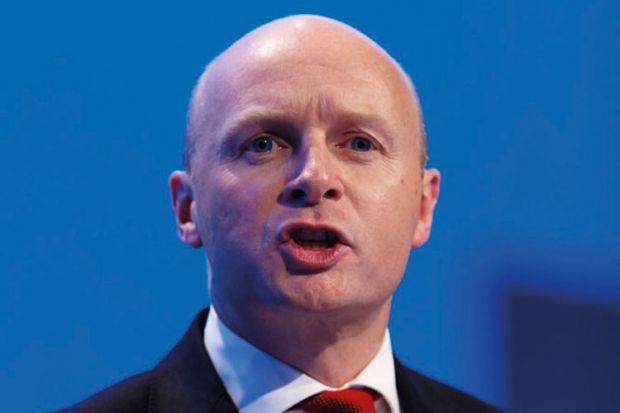Today, we are setting out big steps on higher education policy – steps that reflect hundreds of conversations with university leaders, students, teachers, unions, industrialists and parents.
Our priorities reflect the very best of the sector’s ambitions. We want a bigger, better system that is sustainable, affordable and reformed. A system that will safeguard our world leadership in science, help tackle our productivity crisis and transform Britain’s flagging social mobility.
But let’s start with first things first.
Our universities are too good to fail – but this government has put a debt time bomb beneath them. A slew of reports have flagged how the Tories’ student debt shambles means today’s system is going bust. The Business, Innovation and Skills Select Committee has warned the government is rapidly approaching “a tipping point for the financial viability of the student loan system”. The Institute for Fiscal Studies says that nearly three-quarters of graduates will never pay back their debts – like a lifelong credit card bill for millions of graduates. And this week, Labour revealed the Department for Business, Innovation and Skills had to be handed an extra £2.1 billion this year to cover losses on student loans, while write-offs are expected to soar to an incredible £20 billion a year by 2044, with the Tories’ system adding £281 billion to national debt by 2031.
We can’t go on like this - and if things don’t change it’ll be much harder to keep up investment in the British science base that makes us so globally competitive. This last year has been a banner year for British science but as Sir Paul Nurse has recognised those achievements reflect years of scientists patiently “chipping away at the coal face”. The risk is that support for the future is starting to fail: the latest figures show UK R&D down by £1 billion - and Britain now sits at 23rd out of 33 in the Organisation for Economic Cooperation and Development science spending league table. The research councils have lost £1.1 billion in real terms since 2010. These are dangerous trends - and to stand a chance of reversing them, we need to make sure that university finances are fit for the future.
That’s why we are proposing change: to put university finances back on an even keel. So we will cut tuition fees from £9,000 to £6,000 from September 2016 - benefiting students who began their studies last year - and increase grants by £400, helping students from families earning up to £42,000, a move that will benefit over half of students. We’ve heard loud and clear the message of the National Union of Students and others who have told us that the cost of living confronting students from low-income families is creating a world in which campuses are becoming homes to pay-day lenders. We can’t have that. So extra grants will help - on top of which students will keep their current maintenance loan eligibility - and we will look at making support payments monthly to help students with their budgeting.
We’ve listened hard to what many have said about rising numbers of students - especially from low-income backgrounds like my seat in Hodge Hill. But let’s tell it like it is. There are still 7,500 fewer British students applying to British universities than there were before the fee change. And the government is set to miss this year’s expansion ambition by an incredible 80 per cent. So let’s stop pretending that higher fees are having no effect.
Crucially, because new loans will become more affordable for students, more loans will be repaid. The result is that national debt will fall by an incredible £40 billion by 2030-31, with over £10 billion saved in the next Parliament. Those are savings that will safeguard the sustainability of the system.
Unlike Nick Clegg, we won’t make promises we can’t guarantee to keep. That will require some hard choices. There’s no question of short-changing universities, their research or teaching. We listened to the sector when people said to us that changes have to be fully funded - and ideally fully funded for the entire Parliament to maximise predictability and certainty. That’s a promise that we can give today.
So we’ll fully fund the change with £2.9 billion raised by restricting pension tax relief for those on over £150,000 to the same 20 per cent rate that basic rate taxpayers enjoy, and continuing the government’s policy of limiting tax-free pension pots, by allowing people to get relief on pensions savings up to £1 million, but not more than that. And to make the repayments system fairer we will raise £200 million more by asking the richest future graduates to pay 1 per cent more interest on their student loans.
Together these changes help us deliver a system that is sustainable and affordable, ambitions that reflect what we’ve heard from educators and young people in our biggest ever young peoples’ consultation. Young people voted cutting tuition fees as their second highest priority after raising the minimum wage.
Over the weeks to come we’ll have more to say about reform and our ambition to build a British “dual track” system, creating for the first time a big, wide vocational, professional and technical path to degree-level skills for students who want to earn while they learn, as the Institute for Public Policy Research’s Commission on the Future of Higher Education recommended in 2013. We’ll have more to say about how we help part-time students. More to say about supporting the teaching of high-cost courses. And more to say about repairing the damage to Britain’s global reputation for training international students.
Right now, today’s system isn’t fixing our skills shortages fast enough, nor training young people for the jobs that are there. Skills shortages are getting worse. Yet half of graduates can’t get a graduate job. So we need to bring universities, colleges and business much closer together, and create for the first time a system that allows people to take an apprenticeship-based route to a degree-level qualification, on an “earn while you learn” track. Instead of a return to strict number controls, we want to support partnerships of colleges and universities with employers to grow provision of technical degrees over the long term.
For those who care about our higher education system, there is now a very clear choice.
The Tory party will let the system go bust, threatening the future strength of the British science base, will jeopardise our relationship with Europe (where the UK wins nearly a quarter of European Research Council funding delivering over £1 billion of British science), and continue to damage our position in the global market for international students with short-sighted immigration policies, which have already delivered the first fall in international student numbers for 29 years. And remember that the Tories’ budget for the next Parliament, with its plan for a £23 billion surplus, will mean returning public spending to levels not seen since the 1930s and huge unfunded tax cuts. This could see the BIS budget slashed and science spending put in danger.
Or people can choose a Labour government that will make the difficult decisions needed to fix university finances for the long term, strengthen our relationship with Europe, and take students out of the net migration target. That’s the way we safeguard British science for the long term. It’s the way we fix this government’s failure to improve productivity and the way we get social mobility back on the move.
Over 50 years ago, it fell to Harold Wilson’s government to drive forward the ground-breaking Robbins Report. Inspired by that past, we’re determined to make sure we live up to such proud traditions with a bold plan for the future.
Register to continue
Why register?
- Registration is free and only takes a moment
- Once registered, you can read 3 articles a month
- Sign up for our newsletter
Subscribe
Or subscribe for unlimited access to:
- Unlimited access to news, views, insights & reviews
- Digital editions
- Digital access to THE’s university and college rankings analysis
Already registered or a current subscriber? Login




